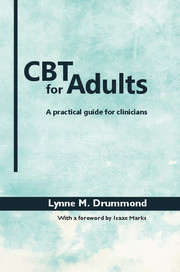Book contents
- Frontmatter
- Dedication
- Contents
- List of tables, boxes, figures and case examples
- Foreword
- Preface
- Structure of the book
- List of abbreviations
- 1 Introduction
- 2 Assessment
- 3 Rules of reinforcement and practical examples
- 4 Social skills training
- 5 Relationship, communication and sexual skills training
- 6 Phobic and social anxiety
- 7 Treatment of obsessive–compulsive disorders
- 8 Depression
- 9 Generalised anxiety disorder and panic
- 10 Body dysmorphic disorder and the somatic symptom and related disorders
- 11 Eating disorders
- 12 Addictive behaviour
- 13 Schizophrenia and the psychoses
- 14 Personality disorder
- 15 CBT in combination with other therapy
- Glossary
- Index
12 - Addictive behaviour
Published online by Cambridge University Press: 01 January 2018
- Frontmatter
- Dedication
- Contents
- List of tables, boxes, figures and case examples
- Foreword
- Preface
- Structure of the book
- List of abbreviations
- 1 Introduction
- 2 Assessment
- 3 Rules of reinforcement and practical examples
- 4 Social skills training
- 5 Relationship, communication and sexual skills training
- 6 Phobic and social anxiety
- 7 Treatment of obsessive–compulsive disorders
- 8 Depression
- 9 Generalised anxiety disorder and panic
- 10 Body dysmorphic disorder and the somatic symptom and related disorders
- 11 Eating disorders
- 12 Addictive behaviour
- 13 Schizophrenia and the psychoses
- 14 Personality disorder
- 15 CBT in combination with other therapy
- Glossary
- Index
Summary
Overview
Alcohol misuse is a major cause of ill health internationally. Harm reduction and treatment programmes are an important part of our health service. Many patients find it extremely difficult to maintain willpower to stop using alcohol, but techniques such as motivational interviewing can help to increase compliance. In this chapter, the application of motivational interviewing, coping skills training and relapse training will be described in the treatment of alcohol misuse. There will also be a discussion about the use of such strategies with other substance misuse. Comorbidity of substance misuse will be explored. Smoking is also a major cause of mortality and morbidity throughout the world and CBT for smoking cessation will be discussed as will the application of CBT in the case history of a problem gambler. Finally, the controversial concept of sexual addiction will be raised.
Alcohol
Alcohol misuse is creating a huge burden to the NHS. Over recent decades there has been an increase in binge drinking as well as an increase in regular drinking in all sectors of society. Whereas historically alcohol misuse was more common in men, nowadays increasing numbers of women are drinking to excess. Binge drinking is mainly a problem among the younger age groups, but an increasing number of middle-aged and elderly people are consuming dangerous levels of alcohol in their own homes and without realising the perils they face (Royal College of Psychiatrists, 2011).
The main problem with alcohol is that it is not only a highly addictive but also a legal drug. Many people thus feel it must be ‘harmless’ and anyone suggesting a reduction in alcohol consumption is a ‘killjoy’. There is thus a social pressure for people to drink alcohol and toleration of excessive consumption until severe addiction occurs. Some of the deleterious effects of alcohol are:
• liver damage (which may eventually lead to cirrhosis)
• pancreatitis (and ultimately pancreatic cancer)
• brain damage
• cardiovascular effects with increased risks of strokes and heart attacks
• increased rate of cancer
• increased risk of accidents
• increase in violent behaviour
• worsening of many psychiatric disorders, including depression.
- Type
- Chapter
- Information
- CBT for AdultsA Practical Guide for Clinicians, pp. 188 - 204Publisher: Royal College of PsychiatristsPrint publication year: 2014



